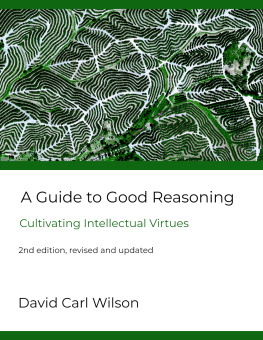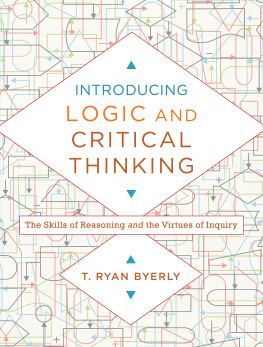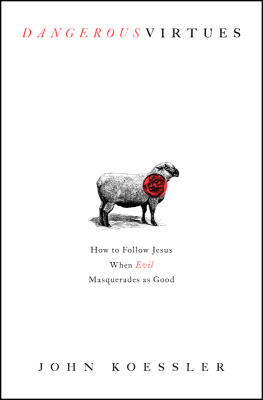David Carl Wilson - A Guide to Good Reasoning: Cultivating Intellectual Virtues
Here you can read online David Carl Wilson - A Guide to Good Reasoning: Cultivating Intellectual Virtues full text of the book (entire story) in english for free. Download pdf and epub, get meaning, cover and reviews about this ebook. year: 2020, publisher: University of Minnesota Libraries Publishing, genre: Religion. Description of the work, (preface) as well as reviews are available. Best literature library LitArk.com created for fans of good reading and offers a wide selection of genres:
Romance novel
Science fiction
Adventure
Detective
Science
History
Home and family
Prose
Art
Politics
Computer
Non-fiction
Religion
Business
Children
Humor
Choose a favorite category and find really read worthwhile books. Enjoy immersion in the world of imagination, feel the emotions of the characters or learn something new for yourself, make an fascinating discovery.
- Book:A Guide to Good Reasoning: Cultivating Intellectual Virtues
- Author:
- Publisher:University of Minnesota Libraries Publishing
- Genre:
- Year:2020
- Rating:4 / 5
- Favourites:Add to favourites
- Your mark:
- 80
- 1
- 2
- 3
- 4
- 5
A Guide to Good Reasoning: Cultivating Intellectual Virtues: summary, description and annotation
We offer to read an annotation, description, summary or preface (depends on what the author of the book "A Guide to Good Reasoning: Cultivating Intellectual Virtues" wrote himself). If you haven't found the necessary information about the book — write in the comments, we will try to find it.
A Guide to Good Reasoning: Cultivating Intellectual Virtues — read online for free the complete book (whole text) full work
Below is the text of the book, divided by pages. System saving the place of the last page read, allows you to conveniently read the book "A Guide to Good Reasoning: Cultivating Intellectual Virtues" online for free, without having to search again every time where you left off. Put a bookmark, and you can go to the page where you finished reading at any time.
Font size:
Interval:
Bookmark:

A Guide to Good Reasoning: Cultivating Intellectual Virtues by David Carl Wilson is licensed under a Creative Commons Attribution-NonCommercial 4.0 International License, except where otherwise noted.
A Guide to Good Reasoning: Cultivating Intellectual Virtues was originally published in print in 1999. The author, David Carl Wilson, regained the copyright for this content which has been revised and updated in this new edition. The cover image, Fruit Tree Orchards, Huelva Spain, is by Overview, source imagery Maxar 2020. Used with permission.
During my 29 year careerI used texts by Barker, Copi, Engel, and Hurley, but this is by far the best. It teaches exactly what every educated person needs to know about good reasoning, and it does so elegantly and efficiently. The chapter on evaluating the truth value of premises is a gem: the best short course on epistemology Ive read. The chapter on explanation is immensely clarifying. I could go on and on in praise of this book.
This [text] is well-written, by someone who has thought carefully about these matters, and who has gone to considerable effort to gather a collection of real, interesting examples for each chapter of the text. I think that it is impressively done.
What I like about this text is the rigor of its content. It presents real, tough philosophical critical thinkingnot some watered-down version.
In every way, I found Professor Wilsons text to be far superior to any other critical reasoning text I am familiar with. [] I know of no other text which presents the material so effectively.
 David Carl Wilson earned his PhD in philosophy from UCLA, where he taught for many years and served in several roles, including Associate Provost. A Guide to Good Reasoning grew out of his frequent teaching of UCLAs large undergraduate course, Philosophy 9: Principles of Critical Reasoning, originated by David Kaplan. Wilson is currently Professor of Philosophy at Webster University, where he served as Dean of the College of Arts & Sciences for 14 years. He teaches in both the Philosophy and the Management Departments; his research concentrates on social philosophy, especially political philosophy and the philosophy of management and leadership, with a special interest in Machiavelli. He serves on the board of trustees of several major organizations; is on the executive editorial board of the academic journal Philosophy of Management; and is the Staff Philosopher for Tennessee Williams St. Louis.
David Carl Wilson earned his PhD in philosophy from UCLA, where he taught for many years and served in several roles, including Associate Provost. A Guide to Good Reasoning grew out of his frequent teaching of UCLAs large undergraduate course, Philosophy 9: Principles of Critical Reasoning, originated by David Kaplan. Wilson is currently Professor of Philosophy at Webster University, where he served as Dean of the College of Arts & Sciences for 14 years. He teaches in both the Philosophy and the Management Departments; his research concentrates on social philosophy, especially political philosophy and the philosophy of management and leadership, with a special interest in Machiavelli. He serves on the board of trustees of several major organizations; is on the executive editorial board of the academic journal Philosophy of Management; and is the Staff Philosopher for Tennessee Williams St. Louis.
This book is dedicated to David Kaplan, the Hans Reichenbach Professor of Scientific Philosophy at UCLA. David created UCLAs critical reasoning course and invited me (initially as a graduate student) to teach it again and again, eventually resulting in this book. More important, David has served as an indispensable and beloved mentor and champion at pivotal times of my life.
A Guide to Good Reasoning is now twenty-one. It has come of age, and is taking a new last name: Cultivating Intellectual Virtues. This highlights the appreciation that many have expressed for the books emphasis on virtues such as intellectual honesty, critical reflection, and empirical inquiry as a foundation for implementing its unified system of explicating and evaluating arguments of all sorts.
This edition features updates and clarifications, while retaining the many features that have made it distinctive for its philosophical care and practical value. You will still find sections, for example, on conversational implicature and judgmental heuristics, on explicating arguments as though the arguer were looking over your shoulder, and on evaluating them as though an honest objector were looking over your shoulder.
Students learn to always askin addition to whether their attitude exhibits intellectual virtueswhether any argument satisfies four conditions of fit: whether the premises fit the world, whether the conclusion fits the premises, whether the argument fits the conversation, and whether it is possible to tell. And they also learn that the notoriously unruly miscellany we call fallacies can be brought under control when each is identified with lapsing either in one these four categories or in intellectual virtue.
I am profoundly grateful to the University of Minnesota Libraries for publishing this second edition, and to Shane Nackerud for his unfailingly cheerful, creative, and intelligent editorial assistance throughout the project. I, of course, remain in the debt of all of my friends and colleagues at UCLA who made such important contributions to the first edition, especially David Kaplan. And I thank Webster University for providing my intellectual home for the nearly two decades since.
David Carl Wilson
Several things are, I hope, distinctive about A Guide to Good Reasoning. They fall into two main categoriesthe practical and the intellectual.
The books chief practical advantage is that it gradually unfolds for the student a single simple systemwhat amounts to a checklist of steps for clarifying and evaluating any argument. There is a standard format for clarifying the argument and a list of things to achieve in the clarification. And, there is a standard format for evaluating the same argument and a list of things to achieve there. The book also provides a handy test for clarifying (imagine the arguer over your shoulder) and for evaluating (imagine a reasonable objector over your shoulder). Useful features abound in support of this practical approach: highlighted guidelines at regular intervals, glossaries, and copious real-life exercises and examples. I have tried hard to achieve the additional practical advantage of writing the book in a clear and inviting style.
The major intellectual advantage is that the book does not treat critical thinking as a grab bag of tips and topicsthat is, not merely as fodder for a course in reasoning appreciation. Rather, it treats it as a philosophical subdisciplineapplied epistemology is probably the best term for itin which all the tips and topics fit together sensibly. The theory behind it is a simple one: good reasoning is ultimately a matter of cultivating intellectual virtuesof developing habits of thought that are conducive to knowledge. And this can best be done by cultivating skill in clarifying and evaluating arguments. Topics as diverse as definition, equivocation, truth, fallacies, deduction, and induction all fit naturally and coherently into such a system. This is not at the forefront of the bookmy aim is to teach a skill, not a philosophical subdisciplinebut it is there. In addition, even though the book is written not for philosophers but for college freshmen, I have tried hard to maintain high standards of intellectual respectability throughout.
Font size:
Interval:
Bookmark:
Similar books «A Guide to Good Reasoning: Cultivating Intellectual Virtues»
Look at similar books to A Guide to Good Reasoning: Cultivating Intellectual Virtues. We have selected literature similar in name and meaning in the hope of providing readers with more options to find new, interesting, not yet read works.
Discussion, reviews of the book A Guide to Good Reasoning: Cultivating Intellectual Virtues and just readers' own opinions. Leave your comments, write what you think about the work, its meaning or the main characters. Specify what exactly you liked and what you didn't like, and why you think so.










